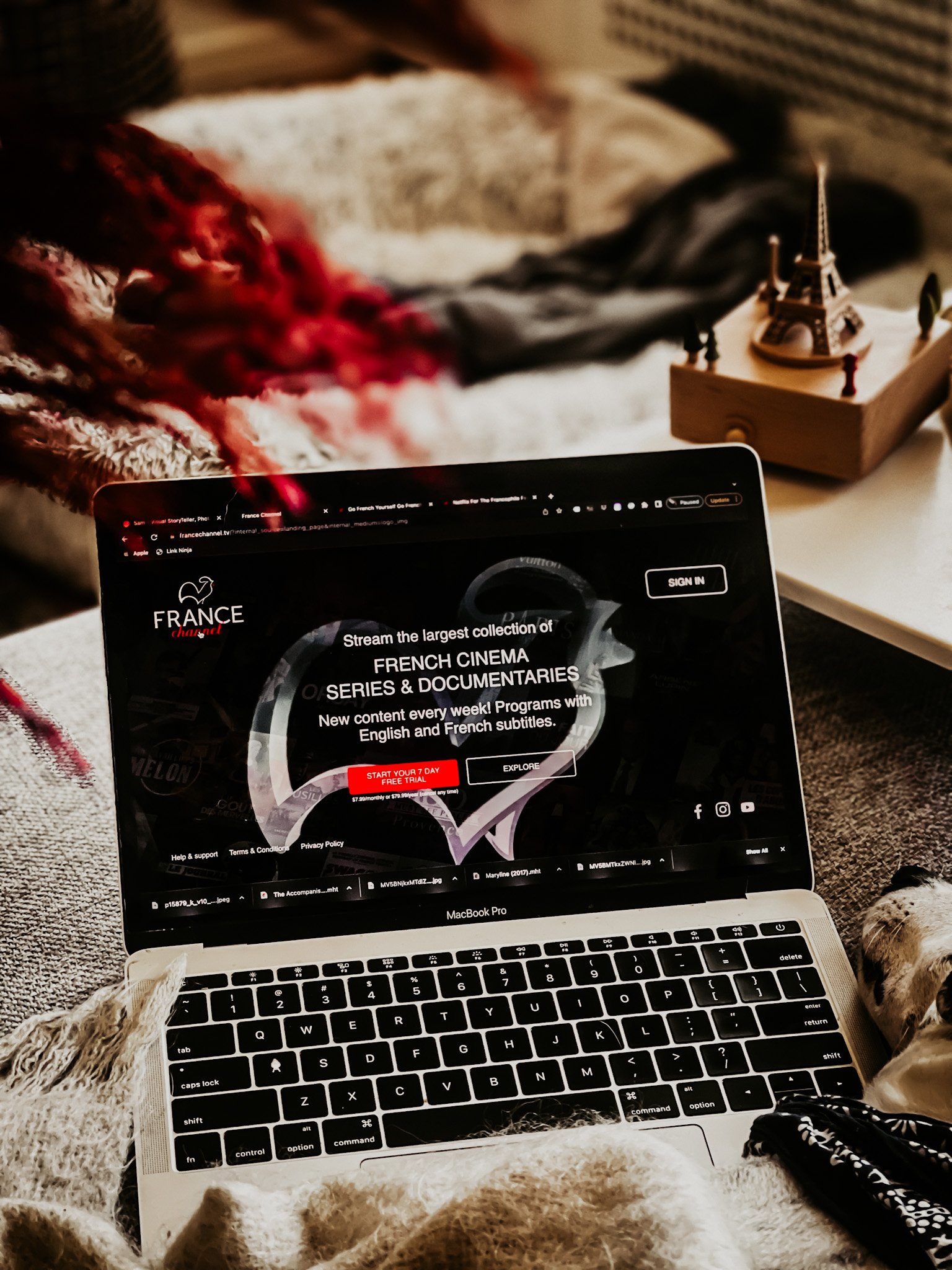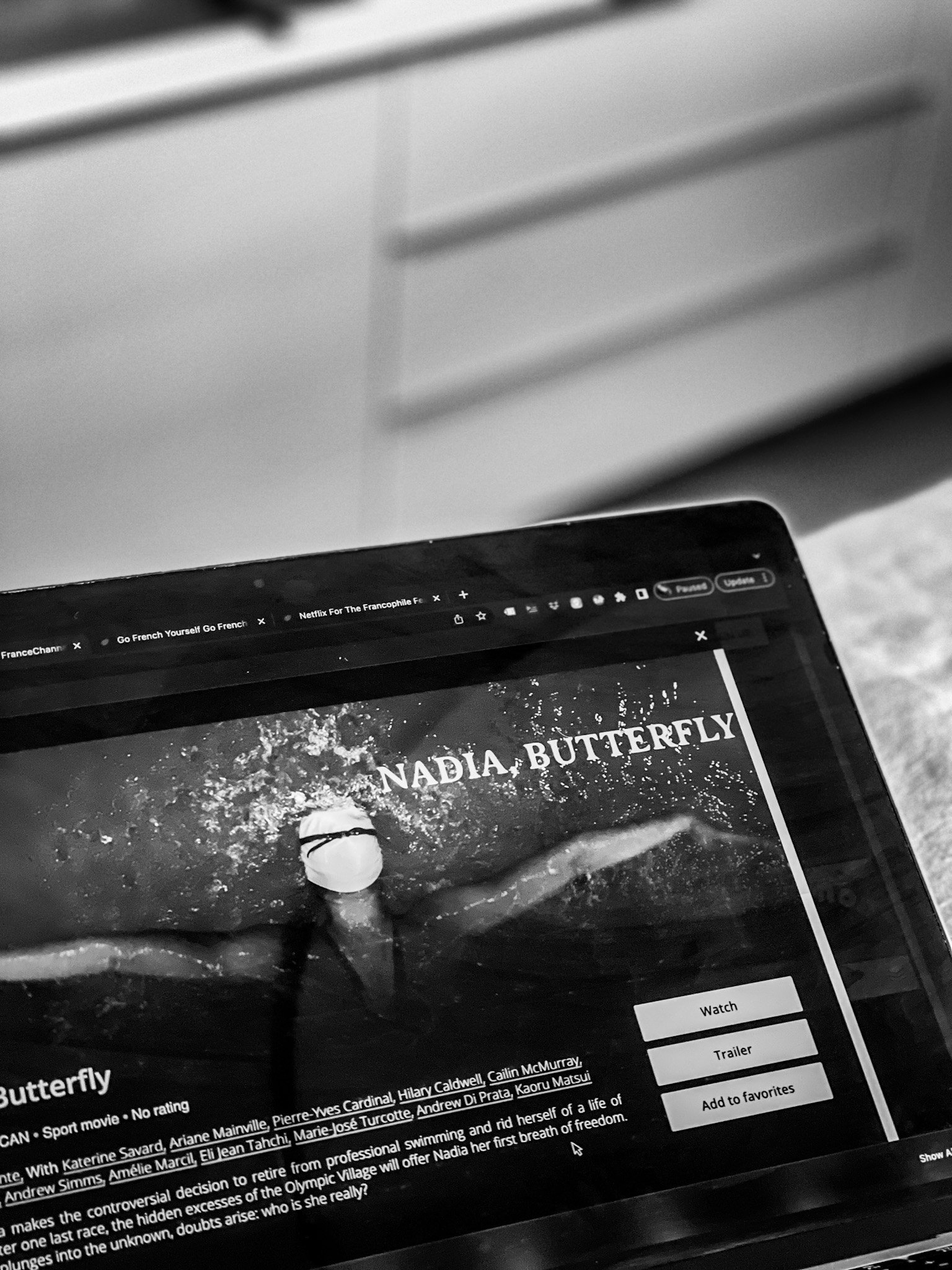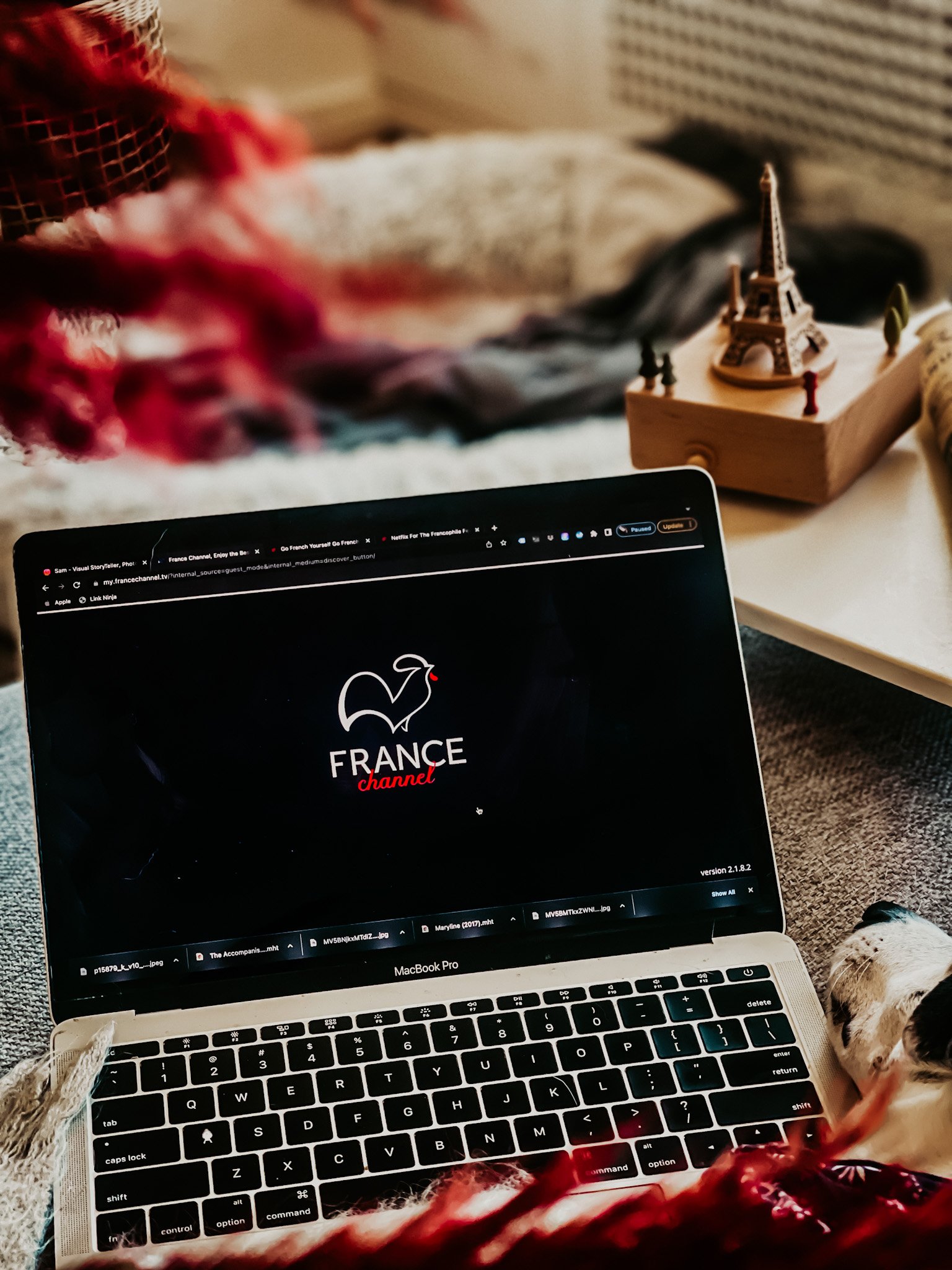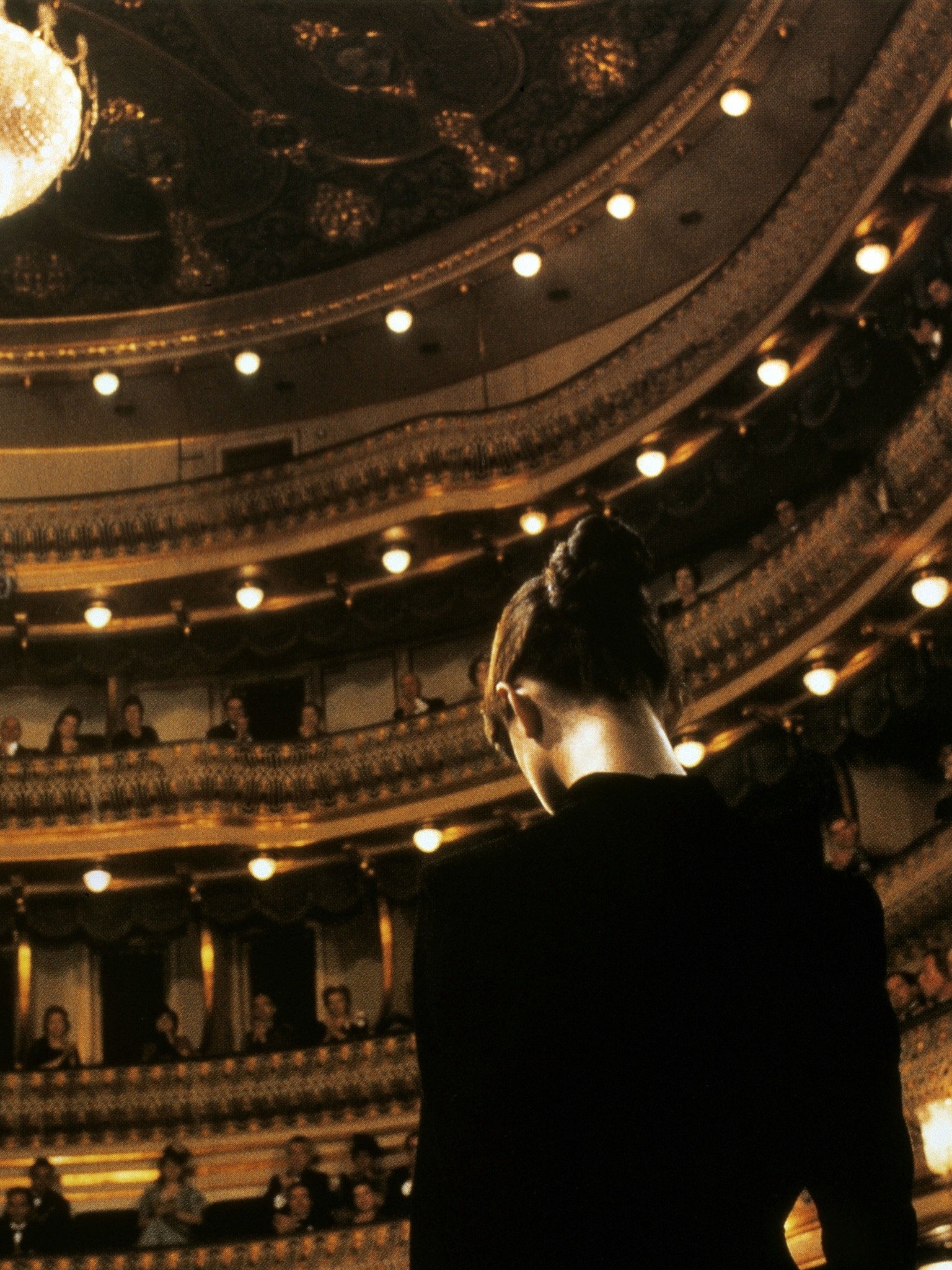Netflix For The Francophile Featuring France Channel
These are a few questions that usually slide into my dm’s weekly!!!
Are there any French TV shows on Netflix?
What is the most watched TV show in France?
How can I get access to more French TV?
I am really feeling the lapse of French cinema and wonder if you notice that too?
French movies are popular around the world, but they are not always easy to access for everyone. Current streaming platforms like Netflix, Amazon Prime and Hulu don’t offer a wide range of French movies and programs and they are often only available for a limited time. France creates about the same number of films as the U.S., but French movies are underrepresented in streaming platforms for a variety of reasons. These include movie company inefficiencies in distribution and internationalizing production along with changing habits of how consumers watch films. Streaming took off during the first pandemic year and the industry is trying to catch up.
Quintessential french content in all various forms is so important to the true (or budding) Francophile, especially as we are wanting to improve the language as well.
As a Francophile, and a Cinephile, I’ve always just loved French film and TV. I find it to be legendary! Watching French movies and TV series has been such a fantastic way to improve my language skills and immerse me more and more in French culture. As someone who is learning the language, I try to listen very carefully while reading the subtitles to associate the words I’m hearing with the translation on the screen. This might sound like work, but when there are entertaining storylines and beautiful scenery, learning the language is made soooooooooooo much easier.
I am thrilled to let you know about an affordable new-to-me streaming service that has the largest collection of French Movies, Series, Documentaries, Cartoons, & even Live News!
It’s called France Channel!
And France Channel is 100% dedicated to French culture and creation, calling itself first “Culturtainment” platform, to attract all American Francophiles, French learners and French living abroad to simply enjoy the best of what France has to offer.
Created by Julien Verley, ex. Canal+ and France Television executive, this new platform intends to promote France and French audiovisual creation around the world.
In order to distinguish itself from traditional streaming services, the platform relies on a large library of French cinema (350 to 400 movies). France Channel also includes a large library of video content allowing to fully discover French culture, in the areas like gastronomy, tourism, history, luxury, lifestyle and art de vivre. New content is added every week to too!
And of course the France Channel is a fantastic tool for learning the French language with a selection of programs available with subtitles in both English and French. No matter how motivated and interested you are in learning a language, let’s face it: sometimes all that memorizing and practicing can be boring. Watching movies makes it fun in my opinion.
You might be thinking that all this sounds great, but how are you, a beginner, going to understand an entire French movie? You don’t want to use subtitles, right? So, should you just stare at the screen for an hour or two? Bien sûr que non! Using French movies to practice your French listening skills doesn’t have to be an all-or-nothing measure, but a gradual process.
la langue française
Start with subtitles
If you need to, start by watching French movies with English subtitles. Pay attention to what you’re hearing. You may notice that some translation choices are a bit unexpected. On rare occasions, you might even realize there’s a translation mistake.
When you get to the point where you’re really paying attention to and recognizing French words and phrases and are able to understand a good amount of what’s being said, move on to the next step: subtitles in French.
Watching a French movie with French subtitles is an excellent way to train your ear. You’ll get used to how words you’ve mostly read up till now are actually pronounced (not always easy to know when it comes to French). And on top of that, you’ll be learning new words and phrases, too.
Slowly remove subtitles
Start with a scene that you’re familiar with and turn off the subtitles. See if you can hear and understand what’s being said. If you can, try to keep going on to the next scene. If not, watch the scene again, this time with French subtitles. Continue to practice this way (with any scene or scenes you like) from time to time.
Now that we’ve got that out of the way, you may be wondering which French movies to watch and here are some of my very faves all available right now in the France Channel app ready for you to stream. And if you know me you know that I adore beautiful cinematography and music in the films that I enjoy!
NADIA BUTTERFLY
From the very first shot, it’s clear that “Nadia, Butterfly” is serious about its swimming; that the people behind and in front of the camera alike have spent a serious portion of their lives in the pool. You can see it in the patient way that Plante watches bodies move through the water, opening the film with a take that lasts for nearly the entire duration of an Olympic final.
This film sometimes mistakes murkiness for ambiguity, but it still resolves as a deeply felt (almost anthropological) look at a rare butterfly in search of the second chrysalis she needs to spread her wings and become herself all over again.
Nadia Butterfly:
Even if “Nadia, Butterfly” weren’t set during the Tokyo 2020 Olympics — the film offering an impressively staged glimpse into an alternate timeline where the world’s biggest sporting event hasn’t been postponed due to a pandemic — Pascal Plante’s sensitive and tactile second feature (following 2018 debut “Fake Tattoos”) would still feel like the ultra-athletic sister that “Lost in Translation” never had.
This intimate, unhurried story of a swimmer at the first major crossroads (or pool turn) of her life may not share the wry comic touch or May/December undercurrent of Sofia Coppola’s Japan-set romance, but it paints a similarly woozy portrait of self-discovery around a young woman who finds herself on the other side of the world. There’s even a karaoke sequence in the middle, a bittersweet drive back to Narita Airport at the end, and a bunch of Beach House cues on the soundtrack.
From the very first shot, it’s clear that “Nadia, Butterfly” is serious about its swimming; that the people behind and in front of the camera alike have spent a serious portion of their lives in the pool. You can see it in the patient way that Plante watches bodies move through the water, opening the film with a take that lasts for nearly the entire duration of an Olympic final. You can see it in the bodies themselves, as lead actress Katerine Savard — a professional swimmer who won a Bronze in Rio — has the kind of surfboard-sized deltoids that aren’t possible to build during pre-production. And you can definitely see it in the matter-of-fact way that the race of a lifetime is over even faster than it began, with decades of training capped off by a security guard shooing the swimmers away from the pool so the next event can begin. Every time Nadia Beaudry climbs out of the water, it feels like she’s leaving a wake.
Seemingly the most famous member of Canada’s women’s Olympic swim team, Nadia has been very open about the fact that Tokyo is going to be her last dance; she’s “retiring” at the tender age of 21 (which is premature even for pro swimmers) in order to go back to school and get an anatomy degree. We don’t know what exactly has inspired Nadia to make this intractable decision, and we don’t know how susceptible she is to the peer pressure from her teammates and her coach to stick around for another cycle, though it’s safe to assume that people don’t reach the Olympics without a certain degree of self-conviction.
She’s kept at a slight remove from us in all but the film’s most intimate moments, as Plante carefully punctures little air holes into the reflective bubble that Nadia — like most of the athletes at her level — has built around her ambitions. It’s a bubble literalized by the Olympic experience, with its badges and private villages and hyper-controlled everything, and Plante’s team does a brilliant job of faking the games and the buzz that comes with them.
The opening passages of “Nadia, Butterfly” are so bracing and immediate that you might not even notice the extent to which they upend the expectations of a typical sports movie. The big relay race that caps off Nadia’s career happens less than 20 minutes into the first act, unfolding in real-time in a sequence that bridges the gap between two different phases of Nadia’s life (cinematographer Stéphanie Weber Biron shoots the event with the handheld 4:3 physicality of an Andrea Arnold film, and it doesn’t feel like an accident that all of Plante’s most palpable influences are women).
This film sometimes mistakes murkiness for ambiguity, but it still resolves as a deeply felt (almost anthropological) look at a rare butterfly in search of the second chrysalis she needs to spread her wings and become herself all over again.
Someone, Somewhere
Rémy is a young Parisian with an unskilled job. Mélanie is a young Parisienne who works in scientific research. Two depressive moods living in close proximity, but being unaware of each other. Will they ever meet?
Someone, Somewhere
Much like the process of psychotherapy, patience is required for results while watching this modestly entertaining slow-burn Parisian romance from Cédric Klapisch, who pulls off a neat trick by bumping the meet-cute to the end of the film.
What happens before his protagonists clap eyes on each other is a kind of emotional spring clean. Both of them, a man and woman in their early 30s, are struggling with anxiety and stress; they find their way to therapy and sift through their secrets and problems, and then, when they are emotionally shipshape … bang! Cupid strikes. It’s a nice idea – but the delay doesn’t do much for dramatic tension, and Klapisch’s shallow observations about loneliness and atomisation in the city don’t help.
Rémy’s first halting meetings with his shrink (François Berléand) are enjoyable to watch. Mélanie, meanwhile, explores her past relationships with her chic psychotherapist (Camille Cottin) who dispenses wisdoms from behind clouds of cigarette smoke. The dialogue between the therapists and clients is thoughtfully written, and there’s a poignant scene in which the two therapists bump into each other at a retirement do.
Not only was the cinematography great, but the threads of the story are well told. The cat getting "lost" and then found by the neighbor, the reconciliation with parents, The trains representing parallel lines in the protagonists' lives, living next door, hearing love music playing from the bathroom vent, passing in the street…..it’s all really quite charming!
Make it stand out
Whatever it is, the way you tell your story online can make all the difference.
Barbara
To fans of the mononymous Barbara – the delicate-voiced, emotionally acute French chanteuse adored by everyone from Jacques Brel to François Mitterand – Mathieu Amalric’s mega-meta, dreamily blurred biopic-within-a-film may seem a bemusing tribute to a national icon. To those unfamiliar with the singer and her work – which is to say the vast majority of people outside Francophone territory – this film is likely to be a more perplexing experience still: an elusive ghost of a celebrity portrait, a meditation on likeness and impersonation in which the subject, the actor and the performance become difficult to prise apart on screen.
Once you settle into your bewilderment, however, Barbara an oddly alluring film that does a double backflip on hokey showbiz-bio convention: not an informative introduction to the singer by any means, but a suitably eccentric evocation of her creative essence. For Amalric, the wonderfully rumpled actor turned turned increasingly unpredictable film-maker, this is a partial return to the frisky, freewheeling style of 2010’s delightful burlesque study On Tour. For his leading lady, the lanky, angular Jeanne Balibar, it’s a complicatedly impressive showcase — one that calls on her to play both a version of Barbara and a version of herself. Her elegant, eerie shuffling and melding of identities keeps the film spry even as its tricksiness wears thin.
Maryline
Maryline wasn't always given the best luck in life, but she certainly has a talent for acting. Too humble and sensitive to embrace her natural fit, she can't help but make an impression on every artist she meets on her path.
Maryline
Without much of a traditional plot, Maryline is basically a vehicle to showcase 30-year-old d’Hermy’s talents on stage and on screen, where until now she has played small roles in films like Yves Saint Laurent and Camille Rewinds. This will no doubt change after people see her in Gallienne’s generous, if somewhat vacuous, portrait of an actress-in-the-making, which follows the titular lead character from one catastrophe to another until she eventually comes into her own.
Set in an unspecified time period that looks vaguely like the late ‘70s or early ‘80s, the episodic narrative picks up Maryline (d’Hermy) as she arrives for her first big movie shoot, which is some sort of costume drama directed by a tyrannical German auteur (Lars Eidinger). Cripplingly shy yet alluring in mysterious ways, Maryline “has something,” as they say about budding stars, though it’s hard at first glance to see what. When she gets her period on set — in a contrived plot device that yields zero laughs — and embarrasses herself in front of the camera by failing to speak up, Maryline winds up loosing her cool, then punching out the director and calling it quits.
For a time she disappears into a working-class life as a mailroom girl in a Coen-esque office building, while also becoming something of a major lush. A few scenes set in her humdrum Gallic village, where her father died and her mother runs a local café, divulge bits of biographical information, but Maryline pretty much remains a cipher. She’s unable to communicate with others, spends a lot of time wallowing in her apartment and seems borderline on the spectrum. Yet when she’s given the chance to perform again — by a kindhearted film director (Xavier Beauvois) and lead actress (Vanessa Paradis), who helps her to overcome stage fright — Maryline manages to find her true calling, which turns out to be in the theater rather than on the screen.
This is definitely an actor’s movie, and one with little concern for story or character or even any kind of general meaning. Yet if you view Maryline as a performance piece rather than as a typical film — although Christophe Beaucarne’s gorgeous photography helps to lend it some cinematic flair — it can be intermittently thrilling to see how d’Hermy’s character slowly but surely crawls out of her shell and learns her craft, leading up to a closing act that’s a tour de force of wordless gestures and suppressed rage. Gallienne cleverly keeps us in the dark during the extended finale as to whether we’re watching a scene from Maryline’s life or a depiction of it on stage, blurring the lines between reality and fiction while doubling down on his movie’s theatricality.
The Accompanist
In Nazi-occupied Paris, a young accompanist named Sophie Vasseur gets a job with famed singer Irene Brice. As Irene's husband Charles, a businessman collaborating with the Nazis, wrestles with his conscience, Sophie becomes obsessed with Irene, taking on the role of maid as well as accompanist, living life vicariously through Irene's triumphs and affairs.
The Accompanist
In Nazi occupied Paris, shy Sophie is hired to play piano for Irene, an elegant singer. Initially in awe of her and her husband, a wealthy but ethically questionable businessman, Sophie soon becomes unwillingly drawn into their life, as she becomes the go-between for Irene and her lover Jacques.
"The Accompanist," adapted by Mr. Miller and Luc Beraud from a novel by Nina Berberova, would be more like "All About Eve" if it were made with anything bolder than Mr. Miller's smoothly contemplative sensibility. As it is, Sophie's Eve Harrington thoughts remain unspoken, delivered to the audience in voice-over while Ms. Bohringer gazes dutifully at Ms. Safonova's lovely Irene. For all her silent frustration, Sophie cannot settle the question of just how actively she ought to assert herself. Her inaction can be seen in wider terms, given the wartime setting and France's larger paralysis during the German occupation.
The third principal in "The Accompanist" is Charles Brice, Irene's husband, a businessman (played by Richard Bohringer, Romane's father). Rich and successful, determined to stay that way, the feisty Charles is sustained by Irene's glamorous career just as surely Sophie is. Charles is the film's most volatile character, the one who goes from idly dropping Marshal Petain's name to realizing it is time to pack the Vuitton luggage and personally carry it over the Pyrenees.
Charles is also the story's main victim, being no match for either Sophie's silences or Irene's treacherous wiles. "Is being a woman so difficult?" he finally asks Sophie, who has become everybody's confidante. "Yes, I think so," she answers, very much in earnest.
Although Mr. Miller (whose earlier films include the 1981 "Garde a Vue") divides "The Accompanist" informally into three sections, one devoted to each of the main characters, it is Sophie who quietly burns a hole in the screen. Catapulted from the deprivation of wartime life to the sumptuousness of Irene's sheltered existence, Sophie quite literally swoons; soon afterward, her first experience of a grand late-night dinner with Irene's admirers makes her physically ill. The film is most striking in watching Ms. Bohringer subtly absorb the lessons of Irene's world and try, not always successfully, to make them her own.
"The Accompanist" is fashionably open-ended in describing this process. Life is said to be passing Sophie by as the film begins, and it is still passing her by when the story is over. A contrived shipboard romance, as Sophie and the Brices flee to England, is never as affecting or credible as it's meant to be, but "The Accompanist" is not the sort of film that is watched for plot. Its chief pleasures are atmospheric, thanks to the keenly observed details of Irene's cosseted existence and the cascade of beautiful music that makes up the score.
The soundtrack incorporates selections by Mozart, Strauss, Berlioz, Schumann and numerous others, making this one more recent French film (along with "Un Coeur en Hiver" and "Tous les Matins du Monde") in which music supplies an extra dimension of sensual delight. The audience will be as overwhelmed by Irene's recitals (with voice supplied by Laurence Monteyrol) as Sophie is herself, as the music combines with the imagery of this radiant, alluring singer draped in white satin and flanked by flowers.
I hope you will give France Channel a try!!! They have graciously partnered with me to offer you 15% off a yearly plan using promo code GFY15 or enjoy 15% off a monthly plan for three months to see if you love it as much as me. That promo code us GFY3M15 .










